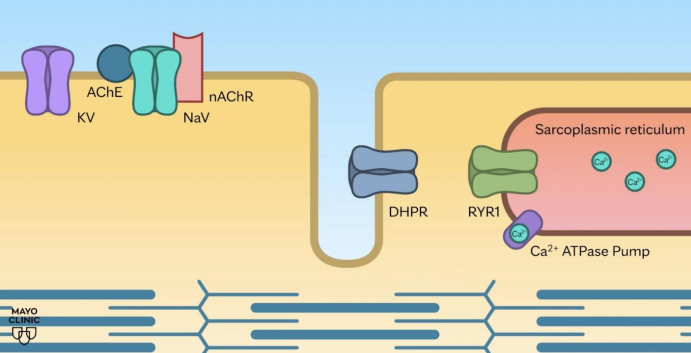Succinylcholine-induced rhabdomyolysis in a patient with RYR1 and BCHE variants: A case report
DOI:
https://doi.org/10.17305/bb.2025.13435Keywords:
Butyrylcholinesterase deficiency, rhabdomyolysis, ryanodine receptor variant, skeletal muscleAbstract
Masseter muscle spasm after succinylcholine can herald malignant hyperthermia (MH) in genetically susceptible individuals. We aimed to describe the perioperative course and genetic findings in a patient who developed transient masseter spasm and postoperative rhabdomyolysis after general anesthesia. This single-patient case report draws on perioperative observations, laboratory testing, and whole-genome sequencing. Immediately after induction with propofol and succinylcholine, the patient experienced transient masseter spasm; anesthesia was then maintained with total intravenous anesthesia (propofol and remifentanil). Postoperatively, laboratory studies showed severe rhabdomyolysis with mild pigment nephropathy; the patient received intravenous hydration, laboratory values normalized by postoperative day 4, and discharge occurred in good condition. Whole-genome sequencing identified heterozygous ryanodine receptor 1 (RYR1) c.1840C>T (p.Arg614Cys)—a known MH-susceptibility variant in the skeletal-muscle ryanodine receptor—and butyrylcholinesterase (BCHE) c.293A>G (p.Asp98Gly), which reduces butyrylcholinesterase activity and delays succinylcholine hydrolysis. The coexistence of these variants likely synergistically increased sarcoplasmic reticulum Ca²⁺ release and prolonged succinylcholine effect, precipitating rhabdomyolysis; to our knowledge, this appears to be the first reported case linking concurrent RYR1 and BCHE variants to rhabdomyolysis following general anesthesia.
Citations
Downloads

Downloads
Published
Issue
Section
Categories
License
Copyright (c) 2025 Tracy E. Harrison, Toby N. Weingarten, Juraj Sprung

This work is licensed under a Creative Commons Attribution 4.0 International License.









